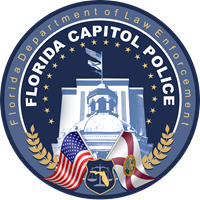 Florida Department of Law Enforcement
Mark Glass, Commissioner
Florida Department of Law Enforcement
Mark Glass, Commissioner

In order to provide a safe environment for all employees and visitors to the Capitol Complex, Capitol Police has developed a list of commonly prohibited items during use of State space. These items include, but are not limited to the following:
Unattended items are subject to being searched by Capitol Police.
Private citizens with a valid concealed weapons permit will be allowed on the Capitol Complex per Florida Law.
Capitol Police may also prohibit other items deemed to pose a risk to public safety or that may impede the normal operations of the Capitol grounds. Exceptions to the prohibited items list may be given on a case-by-case basis through the Capitol Police Director or designee. It is highly encouraged to reserve spaces in and around theCapitol Complex for events through the Department of Management Services.
FDLE is composed of five areas: Executive Direction and Business Support, Criminal Investigations and Forensic Science, Criminal Justice Information, Criminal Justice Professionalism and Florida Capitol Police. FDLE’s duties, responsibilities and procedures are mandated through Chapter 943, FS, and Chapter 11, FAC. To learn more about these areas, read our Statement of Agency Organization and Operation or visit our Open Government page.